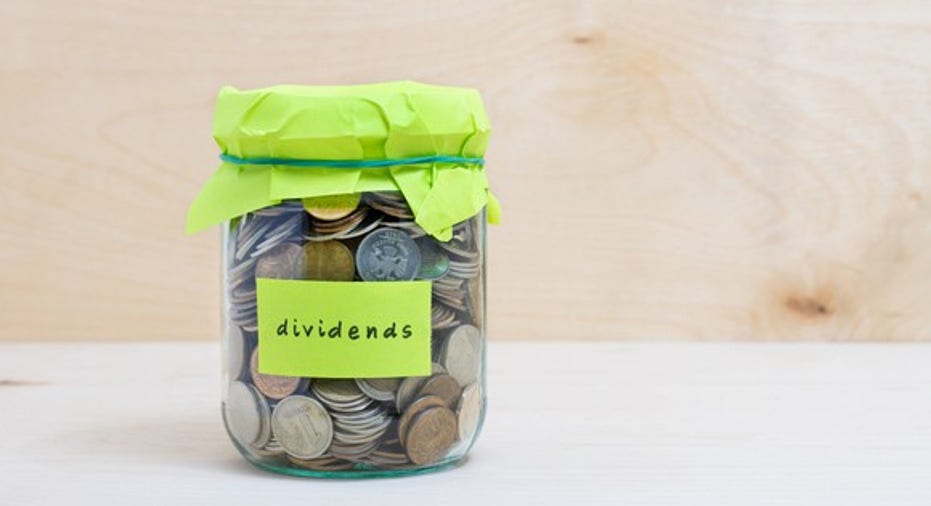Is This Big Pharma Stock's Sky-High Dividend Yield Sustainable?

At nearly 5%, GlaxoSmithKline (NYSE: GSK) offers one of the richest dividend yields among major drug manufacturers. The catch, if you will, is that this seemingly attractive yield is largely a byproduct of Glaxo's falling share price, stemming from the ongoing weakness within its core respiratory medicines portfolio and series of pipeline setbacks.
Despite these woes, Glaxo's management has repeatedly stated that they plan to maintain the dividend at current levels for at least the remainder of this year. But the drugmaker's jaw-dropping 416% payout ratio, uncertain growth prospects, and renewed interest in merger and acquisition opportunities in the high-cost pharma space all suggest otherwise. In fact, Glaxo's dividend appears ripe for a substantial reduction, regardless of management's comments to the contrary. Here's why.
Image source: Getty Images.
Should Glaxo cut its dividend?
While a dividend is always a bonus for shareholders, Glaxo does sport an unseemly amount of leverage on its balance sheet with a debt-to-equity ratio of 328%,and the company has a documented need for an influx of new pipeline candidates in high-value therapeutics areas. In other words, the money slated for Glaxo's dividend could arguably be spent on strengthening its balance sheet, and/or on an acquisition.
Of course, the counterargument is that Glaxo's sky-high dividend is perhaps the key selling point when it comes to attracting investors. But that argument doesn't seem to hold that much weight. Institutional investors, after all, have been steadily marching out of this big pharma stock ahead of the forthcoming introduction of generic versions of the company's top-selling asthma drug Advair in the United States.
The big-picture issue is that market has historically favored big pharma stocks with a growing top line, and it has rarely paid much attention, if at all, to either shareholder rewards or improving bottom lines. If it did, Pfizer would certainly sport a radically different valuation based on its top-notch dividend yield and heavy investment in keeping its bottom line moving in the right direction. And the same can probably be said for Glaxo as well.
So, in a sense, Glaxo is likely doing a major disservice to its shareholders by keeping a top-flight dividend as part of its broader capital allocation strategy.
Key takeaway
Glaxo's newly minted CEO Emma Walmsley is looking to put her fingerprint on the company's business practices and capital allocation strategy moving forward. As part of this effort, Walmsley has decided to review the company's pharma pipeline efforts -- a process that is expected to result in several existing programs being shuttered and external pipeline opportunities taking on a renewed emphasis. This pruning and extending process, though, requires financial wiggle room -- wiggle room the company doesn't have much of right now.
Glaxo is probably heading for a sizable dividend reduction in the near future. After all, the drugmaker's yield is way out of line with prevailing norms within the industry(4.8% vs 3.4% within its peer group), and there's no particularly good reason to sacrifice latent growth opportunities simply to keep up an artificially high dividend.
So, as Walmsley gets settled in, investors shouldn't be surprised if management changes its mind about a reduction or even an outright suspension of the dividend. Such a bold move, after all, would go a long way toward expediting Glaxo's return to solid levels of growth -- and at the end of the day, that's really the name of the game in big pharma.
10 stocks we like better than GlaxoSmithKlineWhen investing geniuses David and Tom Gardner have a stock tip, it can pay to listen. After all, the newsletter they have run for over a decade, Motley Fool Stock Advisor, has tripled the market.*
David and Tom just revealed what they believe are the 10 best stocks for investors to buy right now... and GlaxoSmithKline wasn't one of them! That's right -- they think these 10 stocks are even better buys.
Click here to learn about these picks!
*Stock Advisor returns as of April 3, 2017
George Budwell owns shares of Pfizer. The Motley Fool has no position in any of the stocks mentioned. The Motley Fool has a disclosure policy.



















